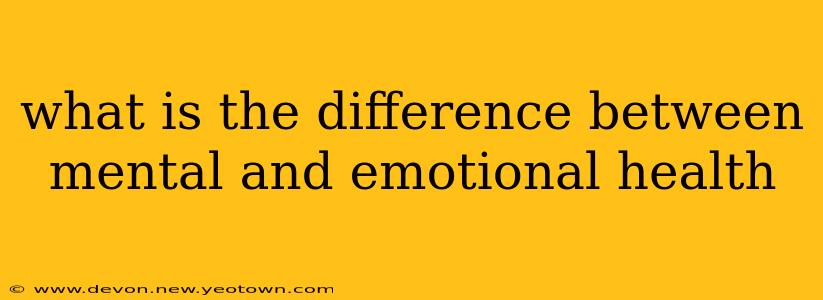What's the Difference Between Mental and Emotional Health? A Journey of Self-Discovery
Imagine your mind as a vast ocean, its depths teeming with thoughts, feelings, and experiences. Mental health is the overall well-being of this ocean – its clarity, its currents, and its ability to navigate the storms. Emotional health, on the other hand, is like the surface of that ocean, reflecting the immediate waves of feelings that ripple across its expanse. While deeply interconnected, they are distinct aspects of your overall well-being. Let's dive deeper into understanding each.
What is Mental Health?
Mental health encompasses the intricate workings of your mind – your thoughts, perceptions, and behaviors. It’s about your cognitive functions, encompassing everything from your ability to concentrate and remember to your problem-solving skills and your overall sense of self. Good mental health allows you to:
- Cope with stress: Navigate life's challenges and bounce back from setbacks.
- Make sound judgments: Think clearly and rationally.
- Maintain healthy relationships: Build and nurture connections with others.
- Feel a sense of purpose: Find meaning and direction in life.
- Experience joy and fulfillment: Appreciate life's simple pleasures and find satisfaction in your achievements.
When your mental health is struggling, you might experience symptoms like persistent sadness, anxiety, difficulty concentrating, or changes in sleep patterns. These can manifest as conditions such as depression, anxiety disorders, or schizophrenia.
What is Emotional Health?
Emotional health focuses on your feelings – your capacity to experience, understand, and manage a wide range of emotions. This includes both positive emotions like joy, love, and contentment, and negative emotions like sadness, anger, and fear. Good emotional health involves:
- Self-awareness: Understanding your emotions and their triggers.
- Emotional regulation: Managing intense emotions in a healthy way.
- Resilience: Bouncing back from difficult experiences.
- Empathy: Understanding and sharing the feelings of others.
- Healthy expression of emotions: Communicating your feelings effectively.
If your emotional health is compromised, you might find yourself struggling to cope with difficult emotions, exhibiting excessive mood swings, engaging in unhealthy coping mechanisms (like substance abuse), or experiencing emotional numbness.
How Are Mental and Emotional Health Related?
Mental and emotional health are intricately linked. Your emotions significantly influence your thoughts and behaviors, and vice versa. For example, chronic anxiety (mental health) can lead to irritability and difficulty concentrating (emotional health). Similarly, unresolved grief (emotional health) can contribute to depression (mental health). They are two sides of the same coin, each influencing and shaping the other.
How Can I Improve My Mental and Emotional Health?
Improving both aspects requires a holistic approach. Some strategies include:
- Mindfulness and meditation: Cultivating awareness of your thoughts and feelings.
- Regular exercise: Releasing endorphins and boosting mood.
- Healthy diet: Fueling your body and brain with nutritious foods.
- Sufficient sleep: Allowing your body and mind to rest and repair.
- Building strong social connections: Nurturing relationships with loved ones.
- Seeking professional help: Don't hesitate to reach out to a therapist or counselor if you're struggling.
What are the signs of poor mental and emotional health?
Signs of poor mental health can include:
- Persistent sadness or low mood
- Loss of interest or pleasure in activities
- Changes in appetite or sleep
- Difficulty concentrating or making decisions
- Feelings of worthlessness or guilt
- Recurrent thoughts of death or suicide
Signs of poor emotional health can include:
- Frequent mood swings or irritability
- Difficulty managing emotions
- Feeling overwhelmed or unable to cope with stress
- Engaging in unhealthy coping mechanisms (substance abuse, self-harm)
- Problems with relationships due to emotional outbursts or withdrawal
Remember, seeking help is a sign of strength, not weakness. If you're concerned about your mental or emotional health, please reach out to a healthcare professional or a trusted friend or family member. Your well-being matters.

